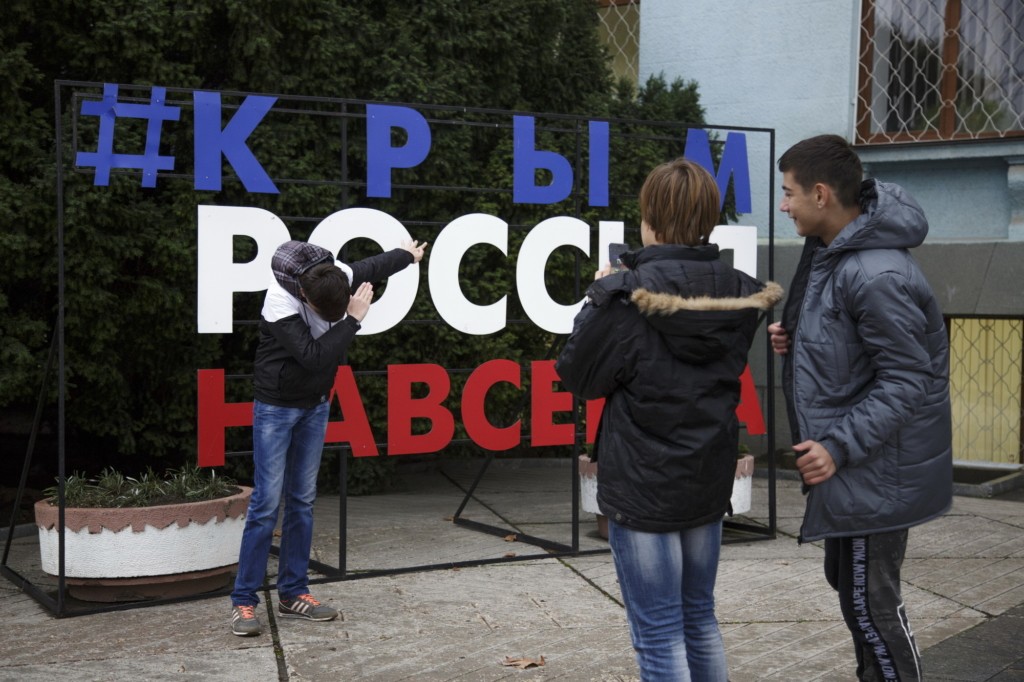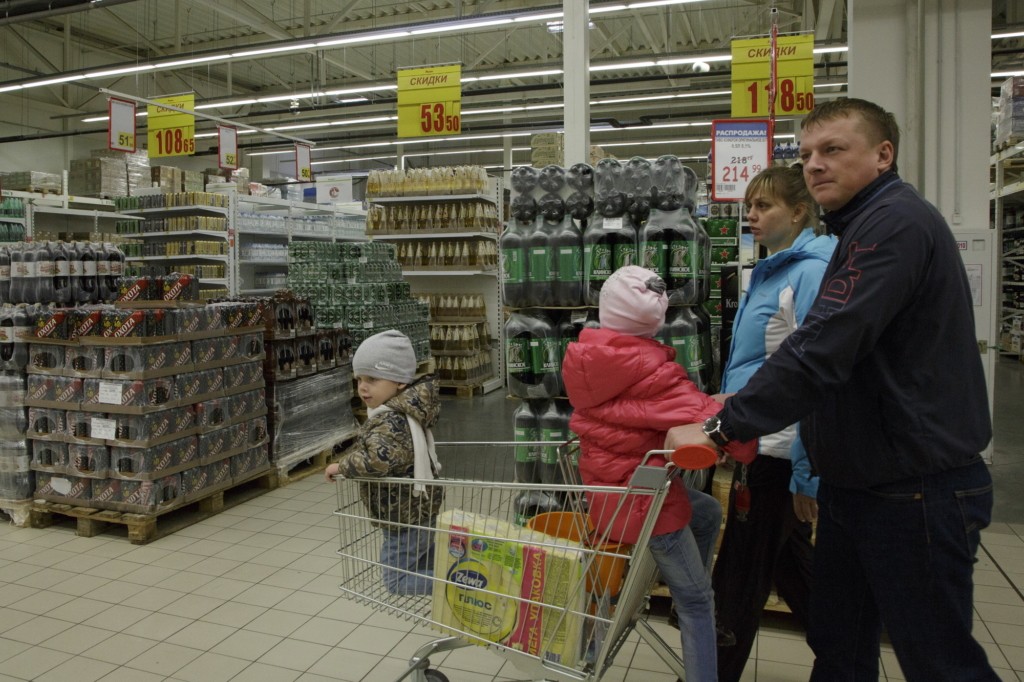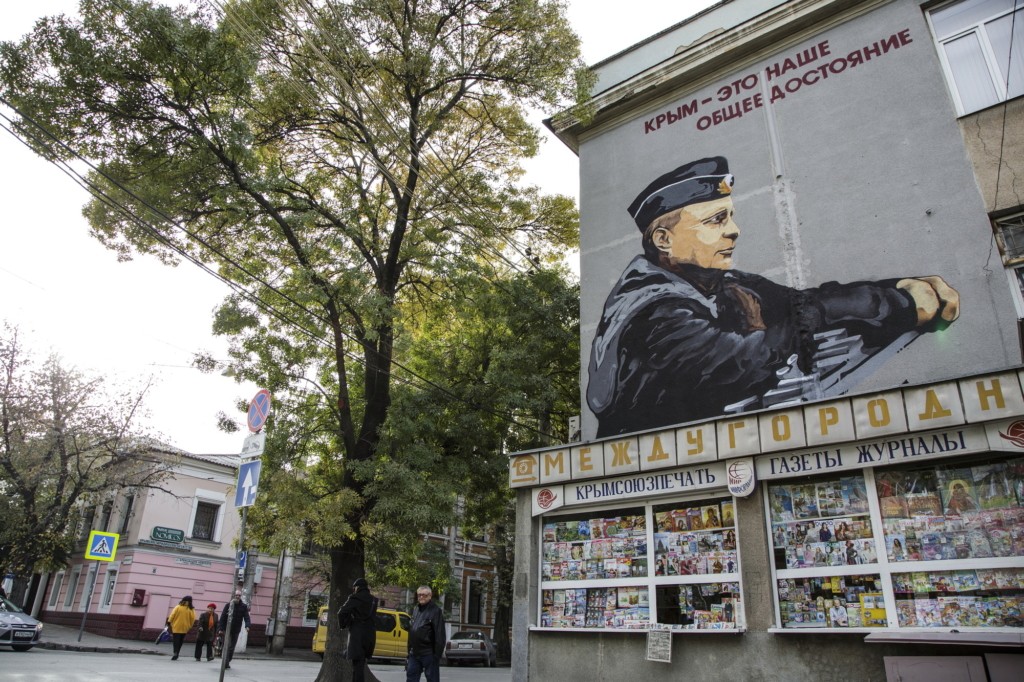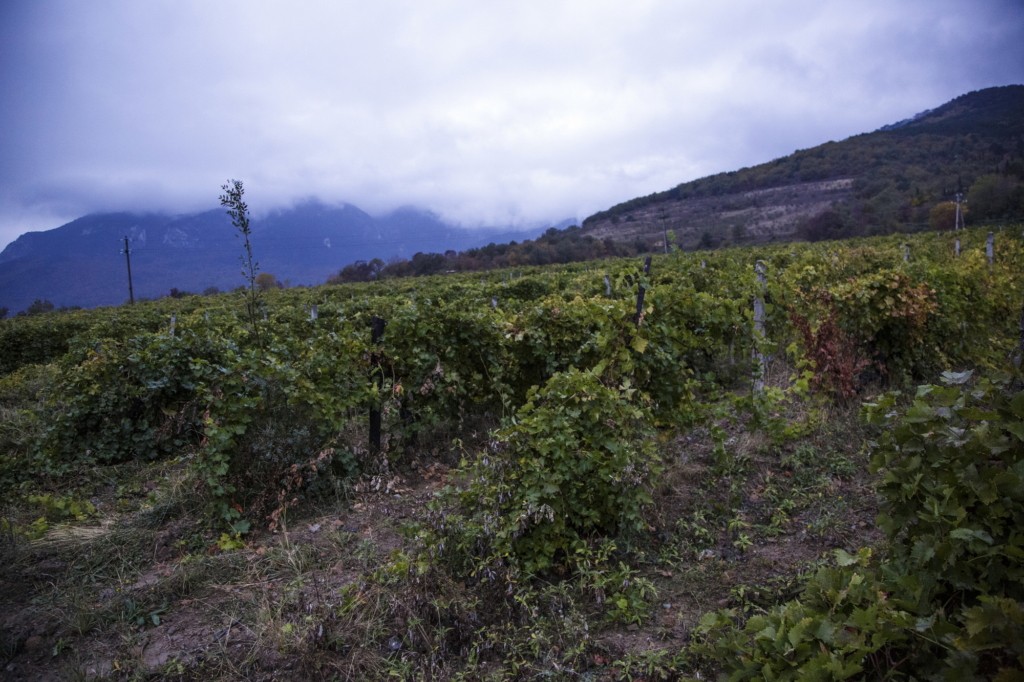Editor’s Note: The following Kyiv Post story is part of the Objective Investigative Reporting Project, a MYMEDIA project supported by the Danish government. The story can be republished freely with credits. Content is independent of donor.
SIMFEROPOL, CRIMEA –– Alongside a stream of rhetoric from Europe and the United States on strengthening measures against Russia over Ukraine and Syria, another, smaller stream is flowing the other way, of foreign business and individuals into sanctioned Crimea.
This month a delegation of 18 Italian regional councillors and business people were the latest to visit Crimea, which is under stringent international sanctions after its annexation from Ukraine by Russia in 2014. The Italians, many of whom are members of the anti-European, separatist opposition party Lega Nord, used the opportunity of a tour of Crimea’s wineries and cultural sites to criticise their own country’s government, European Union bureaucracy and double standards, which they said were depriving Italy of trade and investment opportunities and punishing Crimeans who voted to join Russia.

Men take photos near the sign “Crimea – Russia – Forever” installed on Lenin Square near the Council of Ministers of Russian-occupied Crimea on Oct. 14 in Simferopol. (Kyiv Post)
Russia’s incorporation of the peninsula, following a takeover of the Crimean parliament by Russian soldiers in unmarked uniform and a referendum held two weeks later, is considered illegitimate by the EU and US, along with most of the world. Russia says the referendum was an expression of local people’s self-determination in the face of reported nationalist threats from Kyiv after the toppling of the government there.
While those in Crimea who publicly oppose annexation are now punished with fines and court cases, international recognition is wooed assiduously by Russia and the de facto Crimean authorities.
The Russian Association for International Cooperation, which organised the Italians’ tour, brought individuals from EU states France, Italy, Greece and Bulgaria, as well as from Moldova, Turkey and China to participate in the second annual conference “Crimea in contemporary international context,” held on Oct. 11-12 in Simferopol and Yalta. The overall message was that other countries should challenge “barbaric” sanctions and unite with Russia against the hegemony of Washington and Brussels.
Sanctions on Crimea target individuals, organisations and whole sectors. They ban all currency transactions, investment and tourism with the peninsula. As a result several business sectors have slumped, and foreign tourists who used to be a common sight in summer on cruise-ship stops to the south coast, have disappeared.
Ukraine has been implementing a trade embargo with Crimea since January. It officially stopped supplying electricity at the end of 2015 (Crimea historically received most of its electricity and water supply via Ukraine).
Ukraine, and Crimeans who do not support Russian rule say that sanctions are a legal method of returning Crimea to Ukrainian control.
“Only sanctions will force Russia to leave Crimea,” said Ilmi Umerov, former head of the Bakhchisaray region administration in Crimea. Umerov’s statements that the peninsula is part of Ukraine have landed him in court on charges of ‘public calls to action aimed at violating Russian territorial integrity,’ which now carries a sentence of up to five years in Russian law.
Repression of dissenting voices on the peninsula post-annexation has been condemned by several United Nations and EU human rights bodies.

People shop in Ashan hypermarket on Oct. 19 in Russian-occupied Simferopol, Crimea. The supermarket continues to work in annexed Crimea despite Western and Ukrainian sanctions. (Kyiv Post)
Russian Crimean authorities argue that the sanctions themselves are illegal, and should be appealed on that basis at the UN and other international bodies.
“We don’t consider these measures to be legal, they are contradicting the principles and practice of the United Nations,” said Georgy Muradov, deputy Crimean prime minister and permanent representative of Crimea to the Russian president, as well as deputy chairman of The Russian Association for International Cooperation. “Even if you take a general understanding of sanctions, they contradict this understanding because they touch on the very sensitive matter of the life of people in Crimea, and violate their vital rights.”
To argue the legal point at the conference was Pierre-Emmanuel Dupont, Paris-based director of the Public International Law advisory group, who has years of experience in advising countries under sanctions. He is also an advisor to the UN rapporteur on sanctions.
Sanctions on Crimea and Russia are unilateral, not approved by the UN Security Council, which means their legality can be questioned in European courts and UN human rights bodies, said Dupont. Unilateral sanctions should be proportionate to damage suffered by the imposing country as a result of actions of the targeted state, he said. In the case of Crimea, sanctioning countries are acting on behalf of Ukraine, which is also a point of contention for international lawyers.
Muradov said Crimeans are being punished unjustly by third parties, and their human rights violated in particular by electricity and water cuts from Ukraine, bans on foreign shipping and flights, and other limits on people’s ability to travel.
Muradov is on the individual sanctions list, and had to turn down invitations to Greece and Italy from conference participants.
“We’ll survive without recognition, but we always protest injustice,” he said, at the champagne reception that closed the conference at a Yalta hotel. “This is a total blockade that, if you add the concrete measures taken by Ukraine in shutting off water and electricity, has all the signs of an attempt at genocide of the Crimean people.”
At the same reception, Dupont was more circumspect. “Adverse human rights impact in itself is a reason to seek some limitations in the use of unilateral sanctions, including against Crimea,” he said. “We have been told that Crimea experiences shortages of water and electricity from Ukraine which, with winter coming, is something quite severe. And this can give rise to human rights concerns that the UN has been seeking to address for some time.
After March 2014 Ukraine signed a deal with the new authorities in Crimea to continue electricity supply. Just before the agreement was up for renewal, in November 2015 saboteurs blew up electricity lines in south Ukraine, causing an almost total blackout of the peninsula. A month later Russian President Vladimir Putin ordered a snap survey asking Crimeans if they wanted to renew the Ukraine contract; a reported majority of 94% said no.
Electricity is now supplied via newly-laid cables across the Kerch straits from Russia, but as temperatures drop and daylight hours shorten there are fears that this winter will bring back power shortages.
Nor will Crimeans be able to flee to warmer climes as easily as they used to – and many blame that on sanctions. Foreign travel is complicated not only because flights from the airport now only go to Russia, but because Crimeans cannot get visas in their new Russian passports.

A mural in the center of Simferopol reads “Crimea is our common heritage” on Oct. 14. (Kyiv Post)
After March 2014 international consulates and representatives closed their offices in Crimea. Because most countries do not recognise Crimea as part of Russia, holders of Russian Crimean passports issued post March 2014 are considered to be Ukrainian citizens, who can only apply for visas in Ukraine, with their Ukrainian passports.
Ukraine has put no restrictions on Crimeans applying for new or replacement passports. But individuals must travel across the de-facto border to the Ukrainian mainland to do so, as they must to apply for travel visas.
According to Dupont, Crimeans’ problems with travel, as with electricity, may not fall under either sanctions law or human rights violations. “Some acts that pertain to non-recognition don’t qualify as sanctions,” he said. “Granting a visa is voluntary; it’s not a positive obligation for states, just as there’s no positive obligation for states to trade with one another.”
And as long as that non-recognition remains, Crimeans join the one third of the world’s population who are living in sanctioned countries and regions, he said.
In fact, sanctions and embargo have not kept Ukrainian goods or international companies out of Crimea. Sweets from Ukrainian President Petro Poroshenko’s company Roshen are commonplace in shops. French supermarket Auchan and German Metro Cash-and-Carry continue to trade in Crimea under their own names and logos, through their Russian subsidiaries. And apparently more companies hope to follow suit.
At least one Italian company is ready to sign a contract with the Crimean government to lease land to produce wine in Crimea, according to Davide Sarnataro, secretary general of the Italian-Eurasian Chamber of Commerce, who attended the conference and helped organise the Italian delegation a few days later.
In fact the company, which Sarnataro declined to name or say where it was registered until the contract is signed, is “an international company in reality, based in Italy and made from Italians,” which will create a new company and wine brand in Crimea designed for the Russian and Eurasian market, so as to get round sanctions restrictions.
“It’s 100 percent Italian investment,” he said. Company representatives have visited Crimea three times, chosen sites, and discovered three new types of grape, according to Sarnataro. “Naturally now we have problems with banks, but [the company] are sure they can make a good business here,” he said.

A winery near the Krasnokamenka village near on Oct. 16 in Yalta, Crimea. (Kyiv Post)
Sarnataro explained his presence in Crimea by saying it was important for Europeans to visit to see the true situation. “We come because we want to see what is really happening. We need to work to open doors and build bridges,” he said. “We see that Crimean people are suffering because there is no investment, no economy. And other countries like Ukraine are also suffering.”
Sarnataro and his Italian colleagues who visited Crimea are working in Italy to influence the EU’s decision to impose sanctions, which are up for renewal in Summer 2017. “We are against this decision, and we want it to change,” he said.
So far the promises of direct foreign investment remain just that: promises. Sarnataro said that the unnamed Italian company expects to spend up to five years developing new vineyards before thinking of beginning production.
“With the sanctions we will work three times more, for a result we would usually have with less work,” he said.
Local citizens out enjoying a recent sunny Sunday in Simferopol said they felt the effect of sanctions in the smaller choice of food stuffs and medicines, and lack of foreign tourists. But some said the restrictions had just encouraged Crimea to develop its own resources.
“Maybe in some way it’s better with sanctions, because before, everything came from abroad, and now we’re developing everything ourselves,” said pensioner Nadezhda Ivanova. “We have everything we need; we grow our own and eat our own, it’s all ecologically clean.”
